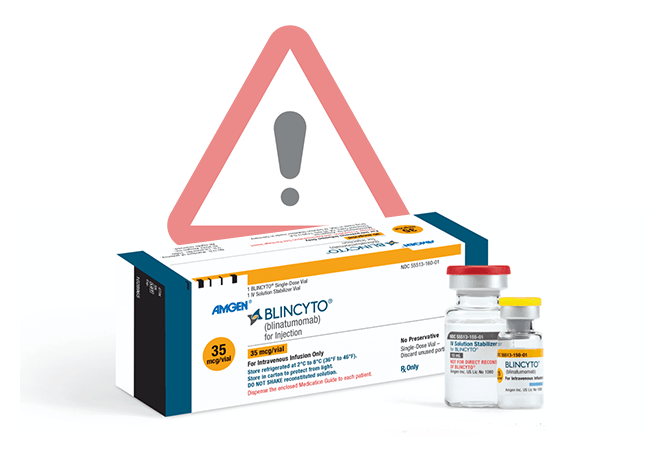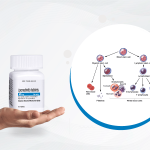Blincyto (blinatumomab) is a bispecific CD19-directed CD3 T-cell engager approved for treating adult and pediatric patients aged 1 month and older with CD19-positive B-cell precursor acute lymphoblastic leukemia (ALL) in first or second complete remission with minimal residual disease (MRD) greater than or equal to 0.1%, Relapsed or refractory CD19-positive B-cell precursor acute lymphoblastic leukemia (ALL), and CD19-positive Philadelphia chromosome-negative B-cell precursor acute lymphoblastic leukemia (ALL) in the consolidation phase of multiphase chemotherapy. This medicine is supplied for injection: 35 mcg of lyophilized powder in a single-dose vial for reconstitution for intravenous use.
Blincyto 35 mcg injection is a type of immunotherapy, meaning it helps your immune system fight cancer. While Blincyto can be very promising, it’s crucial to be aware of the possible side effects and safety information associated with its use.
Serious Infections: Blinatumomab can decrease the number of white blood cells, which are important to combat infections. This can make you more likely to get critical infections. Signs and symptoms of an infection might include fever, chills, sore throat, or cough. It’s important to contact your doctor right away if you notice any indication of infection.
Neurological Side Effects: This medicinal product can affect the nervous system. Potential side effects include seizures, difficulty speaking or slurred speech, loss of balance or coordination, and confusion. Patients need to be monitored closely for any signs of these problems, especially in the first few weeks of treatment. If you notice any of these signs and symptoms, seek medical attention quickly.
Cytokine Release Syndrome (CRS): CRS is a critical condition that can occur when immune cells are activated and release a lot of inflammatory substances. Symptoms of CRS can include fever, nausea, headache, low blood pressure, and difficulty breathing. This condition can be life-threatening and needs to be treated in a hospital. Monitoring for CRS is critical, especially when treatment starts.
Low Blood Counts: Treatment with this medicine can lead to low levels of red blood cells, white blood cells, and platelets. This can cause anemia, increase the risk of infections, and lead to easy bruising or bleeding. Regular blood tests are necessary to monitor blood counts, and treatment may need to be adjusted based on these results.
Liver Complications: Blincyto treatment can cause liver damage, which may be serious. Signs of liver problems include yellowing of the skin or eyes (jaundice), dark urine, and pain in the upper right side of the stomach. Liver function tests should be performed regularly to check for any liver issues.
Allergic Reactions: Allergic reactions to treatment with Blincyto are possible and can be severe. Signs and symptoms may include dizziness, rash, itching, swelling, or trouble breathing. If an allergic reaction occurs, medical help should be sought promptly.
Pregnant and Breastfeeding Women: Blincyto injection can harm an unborn baby, so it’s necessary to avoid becoming pregnant while on treatment with this therapeutic drug. Women who are pregnant or breastfeeding should avoid using the medicine. Relevant birth control should be considered during therapy and for at least 48 hours after the final dose.
Conclusion:
While Blincyto offers hope for numerous patients with B-cell precursor ALL, it’s important to be aware of its potential adverse reactions. Regular monitoring and open communication with your clinician can help manage these potential risks. Always follow your doctor’s instructions and report any unusual symptoms promptly.
For more detailed information about this therapeutic drug, including full prescribing information and a complete list of side effects, please consult your doctor or visit the official website. Your health and safety are vital, so ensure you have all the information you need before initiating Blincyto treatment.
Reference:
https://www.prnewswire.com/news-releases/fda-approves-blincyto-blinatumomab-in-cd19-positive-philadelphia-chromosome-negative-b-cell-precursor-acute-lymphoblastic-leukemia-b-all-in-the-consolidation-phase-302173376.html
What is Blincyto 35 mcg injection used for?
Blincyto (blinatumomab) is approved as an immunotherapy for treating adult and pediatric patients with CD19+ B-cell precursor acute lymphoblastic leukemia (ALL). It is specifically approved for relapsed or refractory cases, minimal residual disease (MRD)+ ALL, and as part of consolidation therapy for ALL.
What are the most common side effects of Blincyto?
Common side effects of Blincyto 35 mcg include nausea, fever, headache, fatigue, and low blood counts. Serious adverse reactions, such as infections, neurological issues, cytokine release syndrome (CRS), and liver complications, may also occur. Regular monitoring and prompt communication with your doctor can help manage these risks.
How is Blincyto 35 mcg injection administered?
Blincyto 35 mcg is supplied as a lyophilized powder for reconstitution and administered as a continuous intravenous infusion. To ensure patient safety during therapy, it is given under strict medical supervision, typically in a hospital or clinical setting.
Can I buy Blincyto 35 mcg online in India?
Yes, patients, doctors, or hospitals can buy Blincyto 35 mcg online in India through trusted suppliers like the Indian Pharma Network (IPN). IPN ensures the legal and safe supply of Blincyto to patients and hospitals in need. To inquire, Call/WhatsApp: +91 9310090915 for assistance with your requirements.
Is Blincyto safe for pregnant or breastfeeding women?
Blincyto may harm an unborn baby and should not be used during pregnancy. Women who are pregnant or breastfeeding must avoid this medicine. Effective birth control should be used during therapy and for at least 48 hours after the final dose to prevent potential risks.






